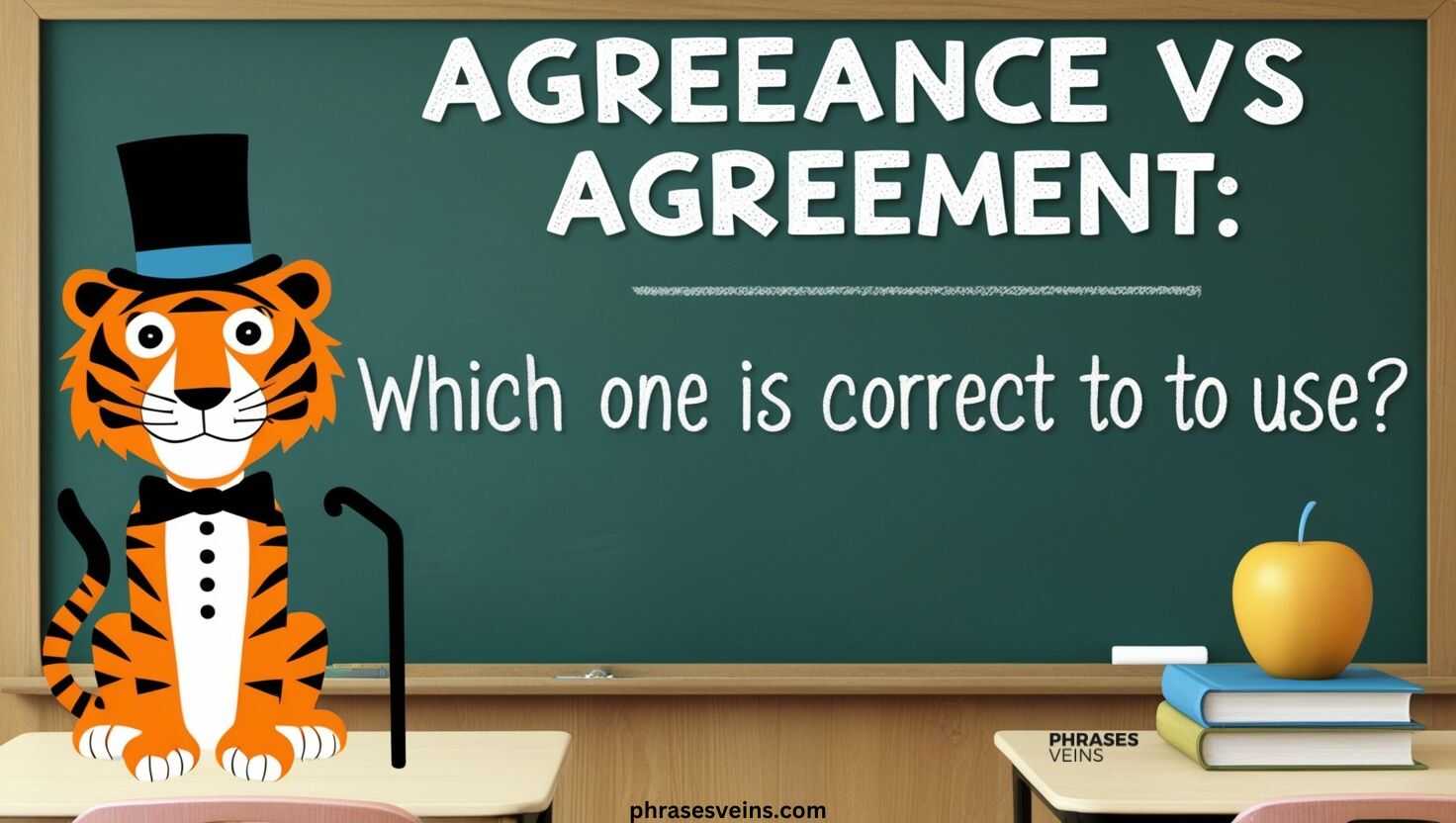In the world of English language, two words often cause confusion for writers: agreeance vs agreement. These terms might seem similar at first glance, but their meanings, usage, and relevance in modern English differ significantly. Understanding these differences is crucial for clarity in both formal communication and informal usage. This guide will help you learn about the correct usage of these terms, the historical background of each word, and which one is more widely accepted in today’s language.
What Does the Noun Agreeance Mean?
The noun agreeance is an archaic term that was once used as a synonym for agreement. However, its usage has significantly declined over time, and it is now considered outdated in modern English. Agreeance meaning refers to a state of coming to a mutual understanding, but it is rarely seen in professional writing or speech.
Historically, agreeance appeared in some older texts and documents. It was used to describe a mutual consensus or decision reached by two or more parties. However, it never gained the same popularity as the word agreement. Today, using agreeance can make your writing sound old-fashioned or informal, which may not be suitable for business or academic contexts.
How Common is the Noun Agreeance?
The word agreeance has become a rare noun in English. According to frequency data and corpus analysis, agreeance usage has drastically decreased over the years. Modern dictionaries often label it as an obsolete or non-standard term.
| Aspect | Agreeance | Agreement |
|---|---|---|
| Usage Frequency | Very low | High |
| Formality Level | Informal/Outdated | Formal & Informal |
| Common Contexts | Rarely used today | Widely accepted term |
| Professional Use | Not recommended | Standard term |
How is the Noun Agreeance Pronounced?
The word agreeance is pronounced as /əˈɡriːəns/. While it may sound similar to agreement, the difference lies in the suffix. Most speakers of modern English prefer to use agreement for both formal and informal usage.
What Does the Noun Agreement Mean?
The noun agreement refers to a shared understanding between two or more parties. It is a widely accepted term used in both legal contexts and everyday conversations. The word is versatile and can be used in business communication, formal documents, and casual discussions.
Agreement definition highlights its role in establishing mutual terms. For example, signing a contract is a form of reaching an agreement. Unlike agreeance, the word agreement has stood the test of time and remains a standard term in modern writing standards.
How Common is the Noun Agreement?
The word agreement is highly common in English. According to linguistic experts, it appears frequently in legal documents, business contexts, and academic writing. It is considered the preferred choice in professional communication due to its clarity and formal tone.
“Agreeance” vs “Agreement”: Which One Should Be Used?
When comparing agreeance vs agreement, the clear winner in terms of modern usage is agreement. The word agreeance is considered outdated and is rarely used in formal contexts. On the other hand, agreement usage is both formal & informal, making it suitable for various settings.
| Aspect | Agreeance | Agreement |
| Definition | Outdated form of “agreement” | Mutual understanding |
| Common Usage | Rare and informal | Widely accepted term |
| Pronunciation | /əˈɡriːəns/ | /əˈɡriːmənt/ |
| Synonyms | Concord, concurrence | Pact, contract, settlement |
| Formality | Informal | Suitable for all contexts |
The Case for “Agreement”:
Agreement is the standard term in both British and American English. It appears in legal contexts, business communication, and everyday conversations. Using agreement ensures clarity and professionalism in your writing.
The Case for “Agreeance”:
The word agreeance might appeal to those who prefer historical usage or want to add a unique flair to their writing. However, it is not recommended in modern English. Experts suggest sticking to agreement to avoid confusion.
Expert Opinion:
Language experts agree that agreement is the preferred choice for clear communication. According to grammar guidelines, agreeance is seen as an archaic term that can cause confusion in professional contexts. Using agreement aligns with modern writing standards and ensures your message is easily understood.
READ MORE >>> 50 Figures of Speech With Examples: The Art of Expression
Agreeance vs Agreement: The Difference Table
| Aspect | Agreeance | Agreement |
| Usage Frequency | Rare | Common |
| Formality | Informal | Formal & Informal |
| Professional Use | Not recommended | Widely used |
| Synonyms | Concord, concurrence | Pact, settlement |
Which One is More Acceptable?
When deciding between agreeance vs agreement, it’s essential to choose the word that best fits the context. Agreement is by far the more widely accepted and appropriate choice in modern English, especially in formal communication. It’s used in legal documents, business communication, and everyday conversations, making it a versatile term.
Experts in language and grammar recommend using agreement due to its clarity, professionalism, and familiarity in both spoken and written forms. In contrast, agreeance is considered outdated, informal, and rarely seen in contemporary writing. If your goal is to convey a mutual understanding or a decision reached, always opt for agreement to avoid any confusion.
In professional settings, such as business contexts or academic writing, using the correct and widely accepted term is crucial for maintaining credibility. Therefore, choosing agreement over agreeance demonstrates your knowledge of modern writing standards and enhances your communication’s clarity.
Difference Between British and American English Usage
In British English, older terms like agreeance might occasionally appear. However, in American English, agreement is overwhelmingly preferred. American English writing standards prioritize clarity and modern usage.
Using “Agreeance” vs “Agreement” in Sentences
Choosing the right term in sentences depends on the formality and context of the conversation. Below are examples to clarify when to use each:
Agreeance (Informal)
- “The team reached an agreeance on the project timeline, but it wasn’t formalized.”
- “There was a mutual agreeance between the two parties, though it remained unwritten.”
In these examples, agreeance works in informal conversations, but it may sound outdated or odd in professional settings.
Agreement (Formal & Informal)
- “The company signed an agreement to collaborate on future projects.”
- “We came to an agreement about the event budget.”
These examples show how agreement is suitable for both business communication and everyday conversations. It’s the preferred term for legal documents, professional emails, and academic writing.
Key Difference:
- Agreeance: Rare, informal, and outdated.
- Agreement: Widely used, formal, and suitable for all contexts.
Origins of “Agreeance” and “Agreement”
The origins of “agreeance” and “agreement” trace back to different periods in the evolution of the English language. While both words stem from the idea of mutual consent, their historical usage and development took separate paths. “Agreement” emerged from Old French influences and quickly became a widely accepted term in legal, business, and everyday contexts.
On the other hand, “agreeance” appeared later but never gained the same level of acceptance, gradually falling out of favor by the 19th century. Understanding the roots of these words sheds light on why one remains a staple in modern English while the other is considered outdated.
Agreement:
- Derived from the Old French word “agreer,” meaning “to please or satisfy.”
- Has been used in English since the 14th century.
Agreeance:
- First appeared in the 16th century but fell out of favor by the 19th century.
- Considered an archaic English term today.
Synonyms of “Agreeance” vs “Agreement”
When expressing mutual understanding or consent, two terms often arise: “agreeance” and “agreement.” While similar, “agreement” is the more widely used term, signifying a mutual decision or understanding. “Agreeance,” though less common, appears in specific or regional contexts but conveys a similar meaning. Understanding their differences and synonyms can improve communication and help you choose the right word.
Synonyms of “Agreeance”
- Concord
- Concurrence
- Consent
- Harmony
- Accord
Synonyms of “Agreement”
- Contract
- Pact
- Settlement
- Arrangement
- Treaty
- Understanding
- Deal
- Covenant
- Accord
- Bargain
Frequently Asked Questions
1. Which is correct, “agreement” or “agreeance”?
“Agreement” is the correct and more widely used term. “Agreeance” is less common and often considered nonstandard, though it has appeared in some contexts.
2. Is “agreeance” obsolete?
While “agreeance” is not entirely obsolete, it is rarely used in modern English. Most people prefer “agreement” as it is more widely accepted in both formal and informal settings.
3. When did “agreeance” become a word?
“Agreeance” has been in use since the 16th century, derived from the verb “agree.” However, its usage has declined over time, with “agreement” taking precedence in contemporary English.
4. How is “agreeance” used in a sentence?
An example of “agreeance” in a sentence might be:
“After much discussion, they were in agreeance about the project’s direction.”
However, this would sound more natural if replaced with “agreement.”
5. What do you mean by “agreement”?
An “agreement” is a mutual understanding or arrangement between two or more parties. It can refer to a formal contract or a simple acknowledgment of shared views or intentions.
6. What is another word for “in agreement”?
Synonyms for “in agreement” include:
- In sync
- In accord
- In harmony
- On the same page
- Of one mind
Conclusion
In conclusion, when comparing agreeance vs agreement, it’s clear that agreement is the better choice. It is a widely accepted term used in business communication, legal documents, and everyday conversations. Using agreeance can cause confusion and make your writing seem outdated. For clarity in communication, always opt for agreement.

Welcome to PhrasesVeins, where Arabella Reed brings language to life. With a passion for grammar and phrases, Arabella offers unique insights to help you master language and enhance your expression. Whether you’re a language enthusiast or looking to improve your skills, Arabella’s work guides you through the beauty of words.

